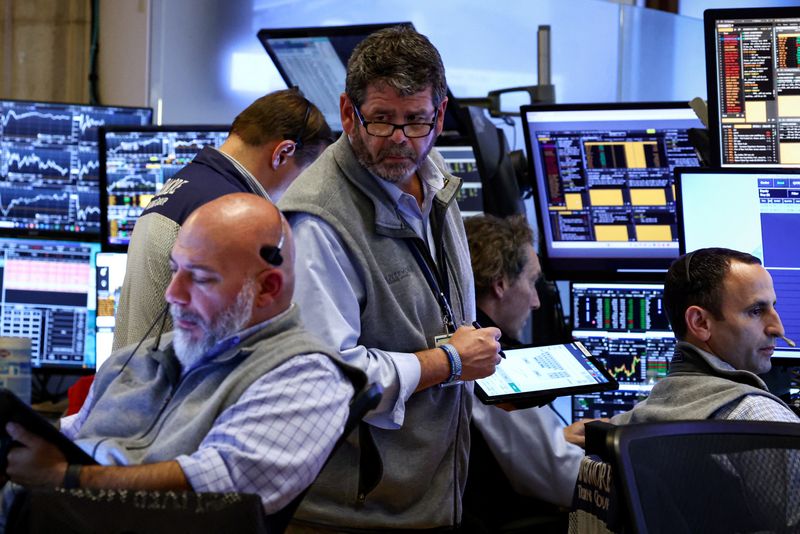By David French
(Reuters) -Wall Street ended higher on Monday, with both the S&P 500 and the Dow posting fresh record finishes, as investors bought into technology stocks ahead of a busy week packed with corporate earnings and crucial economic data.
On a somewhat subdued day for trading, given bond markets were shut due to the federal holiday, just 9.55 billion shares changed hands, versus the 12.05 billion shares, which moved on average over the last 20 trading days.
However, there was enough upward momentum carried over from Friday, when major banks kicked off the third-quarter corporate earnings season on a positive note, to send the Dow Jones Industrial Average above 43,000 points for the first time.
With 41 S&P 500 companies expected to report results this week, this flood of new data points from corporate America will help investors assess the health of the U.S. economy, and whether companies can continue to justify stretched stock market valuations.
Before then though, it was technology stocks, which helped drive markets higher on Monday with semiconductors particularly in vogue. An index of semiconductor companies jumped 1.8% to a more than two-month high, aided by the 6.8% advance by Arm Holdings (NASDAQ:ARM), as well as market heavyweight Nvidia (NASDAQ:NVDA), which rose 2.4% to a record close.
The information technology index was a leading gainer among the S&P 500 sectors, rising 1.4%. Among other growth stocks, Alphabet (NASDAQ:GOOGL), Apple (NASDAQ:AAPL), Microsoft (NASDAQ:MSFT) and Tesla (NASDAQ:TSLA) all advanced between 0.6% and 1.6%.
The S&P 500 gained 44.82 points, or 0.77%, to 5,859.85 points, while the Nasdaq Composite climbed 159.75 points, or 0.87%, to 18,502.69. The Dow Jones Industrial Average rose 201.36 points, or 0.47%, to 43,065.22.
Despite the Dow's positive milestone, its gains on Monday were kept in check by a 2% drop in Caterpillar (NYSE:CAT), following a brokerage downgrade, and a 1.3% fall in Boeing (NYSE:BA) after the planemaker flagged a larger-than-expected Q3 loss on Friday.
Bank earnings may have boosted hopes that solid results could help stocks continue their strong 2024 run. However, with stock valuations stretched - the S&P 500 is trading at 21.8 times forward earnings, versus a long-term average of 15.7 - companies might struggle to satisfy investors.
Year-over-year third-quarter earnings growth for the S&P 500 is estimated at 4.9%, according to data compiled by LSEG on Friday.
"If you think about the earnings backdrop going into it, I would expect the bias to probably lead to the upside in this earnings cycle," said Kevin McCullough, portfolio consultant at Natixis Investment Managers Solutions.
"It's not like the prior earnings cycles where you went in with a really lofty set of expectations and it was really hard for companies to deliver on that," he said, adding because the bar was now a little bit lower, it was easier for investors to see company reports in a positive light.
Among those reporting numbers on Tuesday are a slew of big-name financials, including Bank of America (NYSE:BAC) and Citigroup, as well as healthcare giants Johnson & Johnson (NYSE:JNJ) and UnitedHealth Group (NYSE:UNH).
Investors will also watch for crucial economic data this week, notably the September retail sales figures, for clues on the financial health of U.S. consumers.

Natixis' McCullough said consumer-related data is becoming more important for clues on Fed thinking, as the central bank switches more towards fulfilling the growth side of its mandate.
The two Fed speakers on Monday both adopted cautious tones on future rate policy. Minneapolis Fed President Neel Kashkari said he sees modest interest-rate cuts ahead as inflation hovers near the central bank's 2% target. Speaking this afternoon, Fed Governor Christopher Waller called for "more caution" on interest-rate cuts going forward.